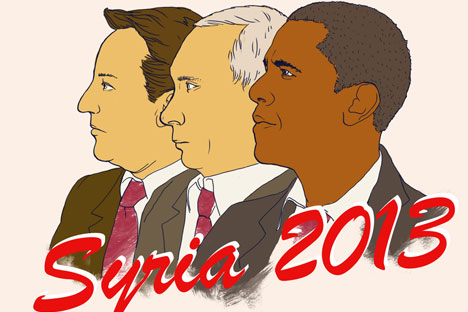
Click to enlarge the image. Drawing by Natalia Mikhaylenko
For much of the Syrian conflict, Russia has prevented a united international response, stopping the UN from condemning regime atrocities and deflecting international pressure for reform. Russia has a vested interest in keeping Syria within its orbit. Syria provides a Mediterranean port and influence in the Middle East, and is part of Russia’s global energy strategy.
But recent developments have shown that Russia can act as a catalyst for a diplomatic solution, precisely because of its proximity to the Syrian regime. It remains to be seen whether the Syrian leadership will destroy its chemical weapons. But if the plan is implemented, there are hopes for a longer-term political solution, although conventional fighting is likely to continue for the foreseeable future.
The Americans argue that the credible threat of military force was key to getting here. General The Lord Dannatt argued similarly on the Telegraph’s pages that military force may be necessary to create an opening for a political solution. The Russian government has to recognise that, unless it uses its leverage over the regime more effectively, talk of military strikes will persist.
But the actual use of military force is problematic. Not only are the ends unclear, but many potential targets are within cities. Strikes are likely both to kill civilians and swell the number of refugees. They risk strengthening support for the regime, and triggering regional attacks by militants. If strikes are too effective, a power vacuum could result, enabling the growth of more radical Islamist groups.
What is lacking from the current debate is a vision for a post-conflict Syria and how to get there. Western governments talk about ‘Assad having to go’ and breaking up the Syrian-Iranian alliance. Apart from the problems of removing a leader who continues to enjoy the support of his armed forces and of a significant part of the population (even if, for many, this is because they fear the alternatives), an abrupt regime change is not in the interest of the Syrian population or the West, particularly if chaos results with possibly severe regional consequences.
Prime Minister David Cameron and others rightly decry the regime’s human rights abuses, although they gloss over the opposition’s abuses. But the right political response is a joined-up strategy, which integrates military, diplomatic and development perspectives, albeit separate from a neutral and independent humanitarian response, and that creates space for local actors to find a sustainable solution, rather than impose an unstable ‘solution’ suiting other states’ interests from outside. External military observers will be necessary to ensure any ceasefire holds (and chemical weapons are destroyed, on all sides). Economic aid and investment will be necessary to help sustain any solution. Training in mediation skills to mitigate, manage and transform the conflict is similarly crucial – both now and to sow seeds for cross-partisan dialogue in the post-civil war phase to avoid a relapse.
Any post-conflict Syria must accommodate the Alawi elite. If this elite were removed, Syria would suffer more acutely from many of the same problems Iraq faced. Unless they can see a political future, this elite may become spoilers and join a Shi’a alliance against any future order.
However, both the ruling elite and Russia need to recognise that the current regime is unacceptable. What form a transitional order should take is a question to be resolved in multi-lateral talks involving all stakeholders (however difficult it will be to identify representatives of all possible stakeholders, including all of Syria’s religious minorities and non-armed community groups). Regional actors, from Iran and Israel to Saudi Arabia, Qatar and Turkey, need to be persuaded to back a solution, lest they become spoilers. Russia and the US need to work together to influence their respective allies on opposite sides of the conflict. And Russia needs reassurance that it will maintain influence in a post-conflict Syria.
Dr Jeroen Gunning is the director of the Durham Global Security Institute. His research focuses on politics in the Middle East and conflict studies.
Do you agree with expert's opinion? Share your experience in the comment section below!
All rights reserved by Rossiyskaya Gazeta.
Subscribe
to our newsletter!
Get the week's best stories straight to your inbox